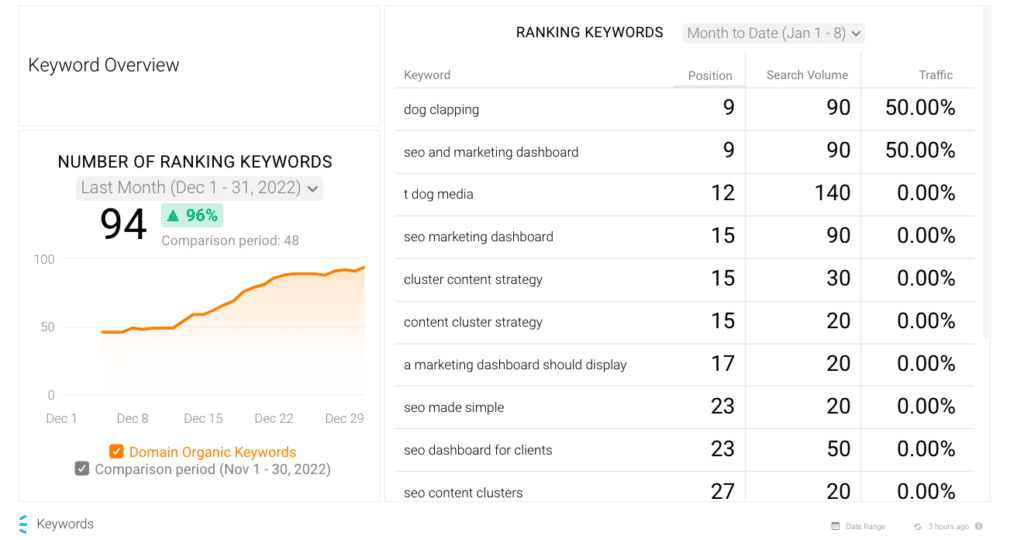One super-important way to measure the health of a website (and business) is to monitor the keyword ranking of the site.
Keyword ranking is the position that a website appears in the search results for a specific keyword.
When someone Googles a keyword. Google returns a list of results that are relevant to the query on the Search Engine Results Page (SERP). The position of a website on the SERP is referred to as its “ranking.” Generally, search results come back with about 10 links per page – this will change with ads and other SERP features. The higher your site is in those results, the more likely it is that people will click on it.
Most users don’t pay much attention to the results at the bottom of the page.
The results at the top are supposed to be the best matches, so that’s where they go for their information.
The big goal is to be as high on the list of search results as possible, you have to consistently market, optimize, create high value content and monitor the results of your efforts to get a high keyword ranking. Backlinko researched and found the Top 3 Google Search Results get 54.4% of all the clicks! Being in the top 3 positions for targeted keywords will make an enormous impact on your business.

Improving keyword ranking is an important part of search engine optimization (SEO) because it will increase the visibility and traffic to a website.
There are a number of factors that can influence keyword ranking, including the relevance and quality of the content on a website or webpage, the number and quality of links pointing to the website or webpage, and the overall authority and trustworthiness of the website.
We monitor client’s keyword ranking monthly. We want to know what keywords are people Googling and what keywords are bringing the most targeted traffic to the site.
How to Rank for More Keywords
There are a number of ways to rank for more keywords and improve your website’s visibility in the search results.
- Research and select high-value keywords: Identify the keywords and phrases that are most relevant to your business and that have a high search volume. KW Finder is our go-to keyword research tool. If you are just starting to monitor your rankings, be sure to target these three types of keywords first.
- Optimize your website’s content: Make sure that your website’s content is high-quality, relevant, and includes the keywords that you are targeting. Use the keywords naturally and in a way that makes sense for your audience.
- Use header tags and title tags effectively: Header tags (H1, H2, etc.) and title tags (the text that appears in the tab at the top of your web browser) help search engines understand the structure and content of your website. Use header tags and title tags to include your target keywords and make it clear to search engines what your website is about.
- Optimize your website’s loading speed and mobile-friendliness: Google and other search engines prioritize websites that load quickly and are easy to use on mobile devices. Make sure that your website is optimized for these factors to improve your ranking.
How to Find Out What Keywords Your Site Ranks For
The easiest way to figure out what keywords your site ranks for is with our Insights Report.
The Insights Report shows the top 20 ranking keywords and shows the percentage of traffic of each keyword.

There are other tools that provide keyword rankings, we love SEM Rush as an alternative to the Insights Report.
What are the benefits of knowing your ranking keywords
Knowing ranking keywords can be useful for a marketing strategy in a number of ways. First, it can help you identify the terms and phrases that are most relevant to your business and the products or services you offer. This can help you tailor your marketing efforts to focus on the keywords that are most likely to attract qualified traffic to your website.
Second, tracking ranking keywords can help you understand how your website is performing in search results. By monitoring the ranking of your website for various keywords, you can get a sense of how well your website is being optimized for search and where you might need to make improvements.
Finally, understanding ranking keywords can also help you identify new opportunities for content marketing and search engine optimization. By analyzing the search trends and patterns for specific keywords, you may be able to identify new topics to write about or new ways to optimize your website to rank more highly for those terms.





